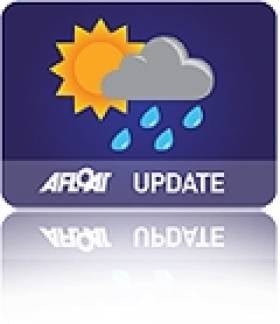Displaying items by tag: temperature
Easy Swim at Forty Foot on Warmest Christmas Day in Years
#WEATHER - Those hardy Yuletide bathers at the Forty Foot in Dublin didn't need to be so brave this year, as Ireland experienced one of the warmest Christmas Days on record.
Just one year ago Ireland was in the grip of a deep freeze. But as the Irish Independent reports, temperatures on Sunday last rose to as much as 14.4 degrees in Co Cork.
It's been almost a decade since late December temperatures reached such levels, when Christmas in 2002 saw highs of 14.6 degrees according to Met Éireann records.
Sunny spells on the east coast brought out the polar bear plungers to Sandymount and the Grand Canal as well as the famous Forty Foot bathing spot in Sandycove.
The Irish Independent has more on the story HERE.
Night in Igloo Raises funds for the RNLI
Brothers Rory (37) and Eoin (36) O'Connor spent last night (Thursday 2 December 2010) in an igloo on Duncannon beach in county Wexford to raise funds for RNLI lifeboats. The pair went into the home-made igloo at 8pm last night and emerged this morning at 8am.
The igloo was built on Duncannon beach by local men Patrick Byrne and David Walsh following plummeting temperature and heavy snowfall in the southeast. On hearing of the structure, Rory and Eoin approached the men to ask if they could spend a night in the igloo to raise funds for RNLI lifeboats. With their agreement they made plans to spend the evening in the ice and brought with them special clothing and sleeping bags to brave the arctic temperatures.
Rory is a volunteer lifeboat helm on Fethard-on-Sea D class inshore lifeboat in county Wexford and when the temperatures dropped on the south-east coast he and his brother Eoin decided to do something to raise funds for the RNLI and to remind people that lifeboat crew go out in all types of weather.
Speaking from the igloo at the end of their night Fethard lifeboat helm Rory said "We are honestly delighted with the response from the public to our sleepover. People were dropping by the igloo all night to say hello and drop some money in the bucket. We even had a local pub send down some hot whiskeys to keep us warm. It was actually quite comfortable and we even managed to get a good night's sleep."
The brothers emerged this morning in good spirits and were looking forward to a cooked Irish breakfast on the beach.
Rory and Eoin have set up a donations page HERE. The brothers have so far raised over €1,500 for the lifeboats.

A night in the cold has produced 1500 Euros so far!





























































